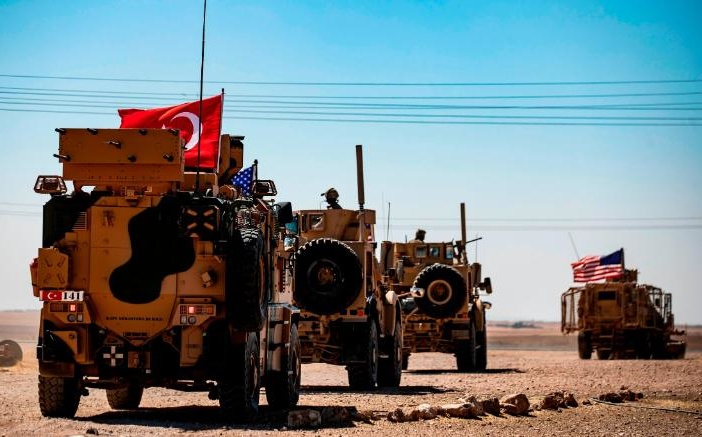A joint Turkish-US patrol in northeast Syria, September 8, 2019
The Trump Administration has accepted Turkey’s control of northeast Syria, including mainly-Kurdish areas, and implicitly endorsed Ankara’s plan for cross-border military operations.
After Donald Trump’s phone call with Turkish President Recep Tayyip Erdoğan, the White House issued a statement on Sunday night:
Turkey will soon be moving forward with its long-planned operation into Northern Syria.
The United States Armed Forces will not support or be involved in the operation, and United States forces, having defeated the ISIS [Islamic State] territorial “Caliphate”, will no longer be in the immediate area.
The statement gave the pretext that European countries had refused to repatriate Islamic State fighters detained in camps in northeast Syria: “The United States will not hold them for what could be many years and great cost to the United States taxpayers.
About 70,000 ISIS fighters and their families are being held at the overcroweded al-Hol camp. More than 70% are children.
However, Ankara’s main priorities have been confrontation of Kurdish groups, notably the Syrian Kurdistan Democratic Union Party (PYD) and its YPG militia, and return of up to 2 million of the 3.6 million Syrian refugees in Turkey.
Last December, Trump impulsively ordered withdrawal of US forces from Syria, following a call with Erdoğan. The Turkish President soon declared a “safe zone” along much of the Turkish-Syrian border, extending east across the Euphrates River to Iraq, and through the Kurdish cantons of Kobani and Cezire.
The Pentagon pushed back against Trump’s command, in part because of concerns of a Turkish attack on Kurdish groups. About 1,000 US troops remain in Syria, half alongside the Syrian Democratic Forces — in which the Kurdish YPG is the main element — and half at the Tanf base in eastern Syria on the Iraq border.
Syria Daily, March 8: US Military Pushes Back Trump — No Date for Withdrawal
The US created the SDF in October 2015 to remove the Islamic State from the northeast. But Turkey considers the PYD and YPG to be part of the Turkish Kurdish insurgency PKK.
Erdoğan has insisted that the “safe zone” must include the withdrawal of the “terrorist” YPG.
Turkey’s Ultimatum to Trump
After months of tension and negotiation, Turkey and the US agreed on oversight of the “safe zone”, 480 km (270 miles) along the Turkish-Syrian border. Joint air and ground patrols began in early September. However, the two sides did not clarify the depth of the zone — Turkey wants 30 km (19 miles) while the US has proposed 15 km — or the operational command of the patrols.
In the past week, Erdoğan, Foreign Minister Mevlüt Çavuşoğlu, and Defense Minister Hulusi Akar stepped up demands that the US accede to the Turkish conception of the zone and military operations.
Erdoğan said on Saturday, “We gave all warnings to our interlocutors regarding the east of Euphrates and we have acted with sufficient patience. We’ve made our preparations, we’ve completed our operation plans, given the necessary instructions.”
Syria Daily, Oct 6: Kurdish Groups Warn Against Turkey’s Attack as Erdoğan Says “Today or Tomorrow”
The Turkish President has said he intends to turn the zone into an area where 2 million Syrian refugees, most of them Arab, will be relocated. The initiative could increase conflict with the Kurdish Autonomous Administration, which has declared a Syrian Kurdistan — Rojava — including the Kobani and Cezire cantons.
Turkish troops and Syrian rebels overran most of the Kurdish canton of Afrin in northwest Syria in early 2018.
SDF spokesman Mustafa Bali said on Saturday, “We will not hesitate to turn any unprovoked attack by Turkey into an all-out war on the entire border to defend ourselves and our people.”
But then came the sudden White House announcement on Sunday night.
Did Pentagon Know of White House Statement?
The US military has insisted on retaining forces in Syria, not only to work alongside the SDF but also check Iran’s influence in the country, including its use as a land route to Lebanon’s Hezbollah.
It is unclear whether the Pentagon agreed with the White House statement, which has Trump hallmarks such as declaration that the “Caliphate” of ISIS has been defeated and his priority that other countries carry the cost of military and humanitarian operations and repatriation of fighters and their families.
Sources said Erdoğan put pressure on Trump by expressing frustration about the “failure” of the US to implement the “safe zone” arrangements.
After the call, the Turkish Presidency said Trump and Erdoğan will meet in Washington next month.


https://twitter.com/jenanmoussa/status/1181108254333718529
Lmao. “Please say sike”